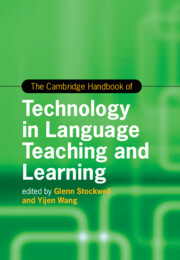Book contents
- The Cambridge Handbook of Technology in Language Teaching and Learning
- Cambridge Handbooks in Language and Linguistics
- The Cambridge Handbook of Technology in Language Teaching and Learning
- Copyright page
- Contents
- Figures
- Tables
- Contributors
- Abbreviations
- Part I Laying the Foundations
- Part II Environments
- Part III Tools
- Part IV Social Aspects
- 14 Social Interaction and Learning
- 15 Virtual Exchange and Telecollaborative Learning
- 16 Collaborative Learning
- 17 Motivation
- Part V Practice
- Part VI Language Skills and Areas
- Glossary
- Index
- References
16 - Collaborative Learning
from Part IV - Social Aspects
Published online by Cambridge University Press: 15 June 2025
- The Cambridge Handbook of Technology in Language Teaching and Learning
- Cambridge Handbooks in Language and Linguistics
- The Cambridge Handbook of Technology in Language Teaching and Learning
- Copyright page
- Contents
- Figures
- Tables
- Contributors
- Abbreviations
- Part I Laying the Foundations
- Part II Environments
- Part III Tools
- Part IV Social Aspects
- 14 Social Interaction and Learning
- 15 Virtual Exchange and Telecollaborative Learning
- 16 Collaborative Learning
- 17 Motivation
- Part V Practice
- Part VI Language Skills and Areas
- Glossary
- Index
- References
Summary
This chapter focuses on digital collaboration when learning an additional language (L2), a specific type of learner–learner interaction. In CALL contexts, collaboration has almost exclusively been researched in connection with writing, which will be the focus of this chapter. The chapter first provides a definition of collaboration versus cooperation and then a literature review of digital collaboration, mainly in writing contexts. We conclude with a list of strategies for promoting collaboration and suggestions for future collaboration contexts and research.
Keywords
Information
- Type
- Chapter
- Information
- Publisher: Cambridge University PressPrint publication year: 2025
References
References
Further Reading
This article started looking at synchronous interactions between collaborators and how learners approached the writing task in addition to examining the writing products.
This book provides a comprehensive introduction to L2 writing pedagogy and covers issues of assessment, task and course design, feedback, and technology.
This study documented examples where learners paid more attention to the meanings within the text than forms in a group-based wiki writing task.
This is the first article where the terms mutuality and equality are used to describe patterns of interaction during collaborative work.
